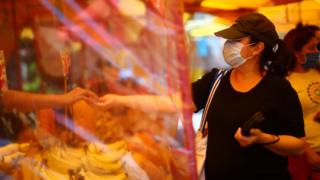This website uses cookies so that we can provide you with the best user experience possible. Cookie information is stored in your browser and performs functions such as recognising you when you return to our website and helping our team to understand which sections of the website you find most interesting and useful.
 Image copyright Reuters
Image copyright ReutersMexico has started removing some restrictions imposed to stem the spread of Covid-19, though deaths and new cases continue to rise in one of Latin America's worst-hit countries.
In Mexico City, factories reopened on Tuesday under strict sanitary rules a day after travel curbs were lifted.
In the state of Baja California Sur - popular with tourists - some hotels and restaurants also resumed activities.
Mexico has confirmed more than 150,000 infections and about 17,500 deaths.
However, the true numbers are thought to be much higher because of insufficient testing.
The country has Latin America's second-highest death toll - after Brazil - and the region's third-highest total of cases, after Brazil and Chile, according to Johns Hopkins University, which is tracking the disease globally.
- Mexico healthcare workers attacked for doing their job
- Latin America's coronavirus crisis in numbers
Under a phased reopening announced by Mexico City's authorities, about 340,000 factory workers returned to their jobs on Tuesday. Small shops will be able to reopen on Thursday while professional services and some other workers are allowed go back from Friday.
Street markets and the historic city centre could be allowed to reopen next week if conditions were deemed appropriate, authorities said. Churches and restaurants would also be able to resume activities at a reduced capacity.
President Andrés Manuel López Obrador is eager to restart the economy, and his government announced a phased plan to lift restrictions. But critics say he was slow to impose the measures and now has been too quick to lift them.
Most of the economy was stopped from 23 March but some industries that were declared key to the functioning of the nation were exempt from the restrictions.
Between March and May, more than one million jobs were lost across the country, according to official numbers. The impact of the measures, however, is thought to be much worse as Mexico has high numbers of people in the informal economy.
On Monday, beaches reopened in Baja California Sur, home to the popular twin resorts of Los Cabos. Hotels and restaurants can only operate at 30% capacity, and people are being urged to follow social-distancing measures.
Quintana Roo state, where Cancún is located, started to reopen last week under strict measures.
Tourism is a key sector in the Mexican economy and, in April, the country registered only 86,000 foreign visitors, down from 2.8 million the same month last year, according to official data.
On Sunday, Deputy Health Minister Hugo López-Gatell said the first wave of the outbreak in the country was expected to last until October.

Media playback is unsupported on your device



 Africana55 Radio
Africana55 Radio 
